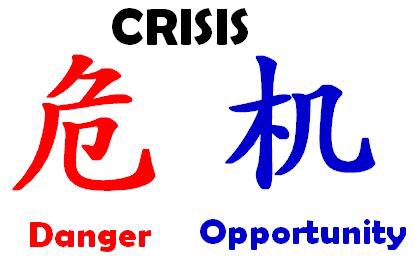
As we ease back into something resembling normal schooling (while still being ready to act if infection rates make a jump), at St Columba, we are looking at what we have learned about teaching and learning from our experiences.
If you have been a long term viewer of education you will have noticed that some educational practices find their way into schools and establish themselves for decades. Others seem to come and go in a shorter time period.
Then there are those that come because circumstances force us to move away from the comfortable, traditional modes and into a new realm that combines difficulty and possibility.
The Chinese word for “crisis” (simplified Chinese: 危机; traditional Chinese: 危機; pinyin: wēijī, wéijī) is frequently invoked in Western motivational speaking as being composed of two Chinese characters signifying “danger” and “opportunity” respectively.

This third category comes when circumstances force us to quickly and even radically adapt our teaching. This can cause great stress on teachers and involves hundreds of hours of extra work but can also:
- help expand teachers’ thinking beyond their current approaches to teaching and learning;
- help show the downsides and limitations of some current teaching practices;
- expand the conversation around the new ways of teaching;
- trigger experimentation and endeavours that promote further innovation and refinement in teaching.
The rapid transition from face-to-face learning to a wholly online model was stressful and hard work and it would be wasteful not to use our experience to learn from the experience. We are going to determine what aspects of our online learning we can adapt to our longer term teaching and learning to decide how some of these strategies could enhance our professional delivery.
Therefore, the Heads of School and Educational Directors will be undertaking a process where we examine what we have developed in this crisis that:
- have allowed teachers to experiment, finding new and engaging ways of teaching;
- demonstrate new applications not thought possible under normal circumstances;
- can be used as a supplement to or a replacement for aspects of previous teaching strategies;
- can lead to developing a different construct that works within the established culture, beliefs, values, and norms of existing pedagogy;
- can aid in progress toward a new mental and cultural construct of teaching;
- can help us to recognise larger changes in education that are soon to arrive.
We will do this, not only because it will be fertile ground for our educational improvement, but because it is part of our determination to keep improving so that our School and its educational model remains relevant, engaging and sustainable in this ever-changing world.

“Those who learn and adapt faster have a competitive advantage.
Organizations with a structured change management process and an organizational change
management competency have the ability to learn and adapt faster with greater results”.
McKinsey & Company.


